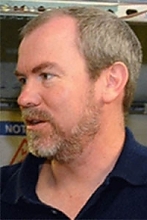“Reservoir Computing Prediction and Classification Capabilities: From Software to High-Speed Hardware Accelerators”

Location: LTS Auditorium, 8080 Greenmead Drive
Speaker:
Daniel P. Lathrop
Professor, UMD Department of Physics and Department of Geology
Abstract:
Machine learning is used extensively in industry and is well-developed as a software tool with advanced capabilities. Traditional feed-forward networks are slow to train due to the underlying nonlinear optimization required. Alternate techniques such as reservoir computing (also called echo state systems) have greatly reduced training requirements. The training is done via one final linear least squares problem. These algorithms show surprising capabilities in various tasks, such as image/video classification, spoken word discrimination and the accurate short-term prediction of chaotic and turbulent systems. These capabilities are demonstrated both in the literature and in our own tests at UMD—all of which use simple software algorithms. Further, the techniques can be instanced as hardware with significant speed increases.
Based on reservoir computing techniques, we have developed a novel artificial intelligence (AI) neuromorphic electronic chipset that identifies and classifies patterns in time-dependent signals at high speed. We have provisional patent protection on designs that implement those software models in low-power, high-speed hardware—the Recurrent Processing Unit (RPU). These auxiliary processors can realize significant computational speed-up, 500 TOPS per chip (Trillion Operations per Second), and power savings, 6 TOPS/W, much like GPUs transformed computing. Our technology roadmap has a short-term milestone of a PCIe card that can be then benchmarked against various classification and prediction AI tasks. The chipset could perform various tasks such as distortion correction in wireless communications, internet traffic classification, speech recognition, and more.
Bio:
Daniel Lathrop is a professor in the UMD Department of Physics and Department of Geology.
His research in the Nonlinear Dynamics group focuses on a variety of high dimensional nonlinear systems.
Lathrop joined UMD in 1997, the year he received a Presidential Early Career Award from the National Science Foundation. He is a Fellow of the American Physical Society and a Fellow of the American Association for the Advancement of Science.
Lathrop was director of the UMD Institute for Research in Electronics and Applied Physics from 2006-2012, and is currently chair of the campus Export Control Committee. In 2012, he received the Stanley Corrsin Award from the American Physical Society for his work in fluid dynamics.
He previously served at Yale University as a postdoctoral fellow, research affiliate and lecturer, and as an assistant professor at Emory University.
Lathrop received his doctorate in physics from the University of Texas at Austin in 1991.
